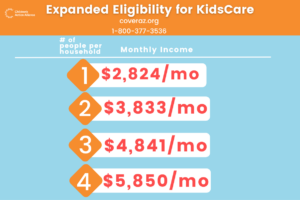Nearly 103,000 Arizona kids lost AHCCCS, but KidsCare expansion brings hope.
Since the end of the public health emergency a year ago, 103,000 fewer Arizona children are enrolled in AHCCCS coverage with the return to regular renewal requirements, according to a new report from Georgetown University Center for Children and Families. AHCCCS and its companion KidsCare provide child-specific health insurance for nearly 900,000 children, including routine preventive care, developmental screenings and treatment, vaccinations, behavioral health, and vision and dental services.
While some of these children may have gained other coverage, through a parent’s employer or the Health Insurance Marketplace, more Arizona children likely have become uninsured in the past year.
But there is good news. On April 1, the income limit for KidsCare increased by nearly $10,000 a year for a family of four, meaning 10,000 additional Arizona children will become eligible. Also, at the beginning of this year, new federal requirements took effect providing 12 full months of continuous coverage for children in AHCCCS and KidsCare, meaning fewer administrative requirements for families to maintain their healthcare coverage.
Children’s Action Alliance continues working with our community partners and AHCCCS to increase children’s access to coverage. If you or someone you know needs health insurance, visit Cover AZ’s website to find a local community-based organization to help.
Click here for the full report.

